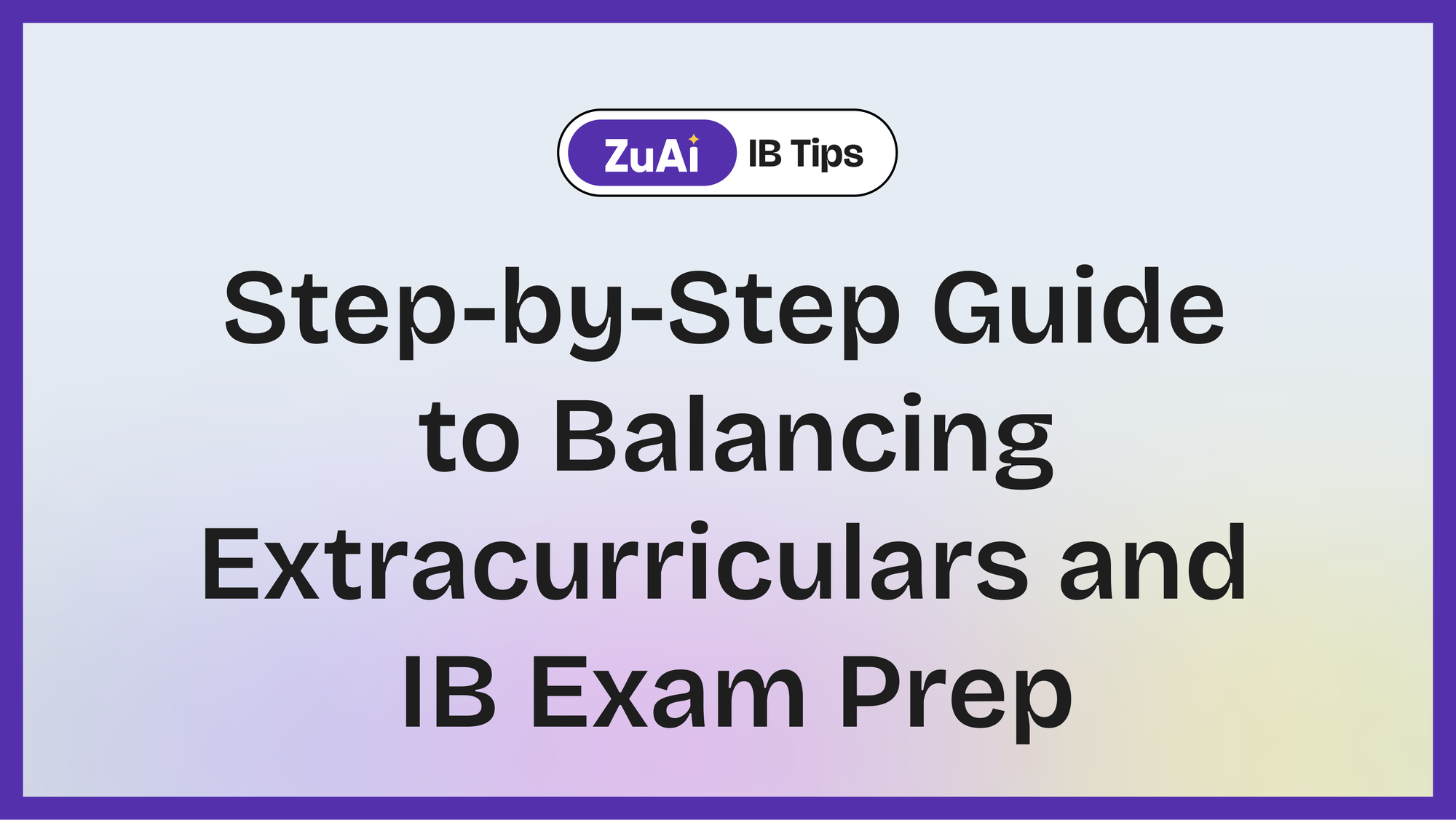Step-by-Step Guide to Balancing Extracurriculars and IB Exam Prep

Author: ZuAI
Step 1 – Prioritize Your Activities
Start by listing all the extracurricular activities you’re involved in. Ask yourself:
- Which activities are most important to me?
- Which ones contribute to my personal or academic goals?
- Which can I temporarily reduce or put on hold during exam periods?
Some activities, like sports or leadership roles in clubs, may offer long-term benefits (e.g., college applications) and should be prioritized, while others might not be as crucial during the exam season.
Step 2 – Create a Realistic Weekly Schedule
Creating a schedule that works for both your extracurriculars and your IB study plan is essential. Break your day into blocks, dedicating specific times to study and specific times for activities.
Pro Tip: Use digital tools like Google Calendar or productivity apps such as Notion or Trello to organize your day. Color-code your study sessions, extracurriculars, and relaxation time to ensure you don’t overbook yourself.
Sample Weekly Schedule:
- Monday-Friday:
5:00 pm - 6:00 pm: Extracurricular Activity (Sports practice, club meeting)
6:00 pm - 8:00 pm: IB study (specific subjects)
8:00 pm - 9:00 pm: Relaxation or personal time - Saturday:
Morning: IB exam preparation
Afternoon: Community service, volunteering, or extracurricular projects
This way, you dedicate time to both study and outside activities while leaving room for self-care.
Step 3 – Use Time-Blocking for Efficient Study Sessions
Time-blocking involves breaking your study time into focused sessions, which helps you stay productive while ensuring your extracurricular commitments don’t suffer. The Pomodoro technique—studying for 25 minutes followed by a 5-minute break—can be particularly useful.
Here’s how to apply it:
- Dedicate 1-2 hours each day to your IB subjects (Math, History, Science).
- Break those hours into manageable blocks (e.g., 25 minutes of study, followed by a 5-minute break).
- Use your breaks to relax or mentally prepare for your extracurricular commitments.
This method maximizes your study efficiency without feeling mentally exhausted, making it easier to transition between studies and activities.
Maximizing Productivity During Extracurricular Periods
Step 4 – Focus on High-Yield Study Strategies
When balancing IB exams and extracurriculars, the goal is to study smarter, not harder. Prioritize high-yield study strategies that give you the most benefit in the least amount of time:
- Past Papers: Regularly practice IB past papers to familiarize yourself with exam formats and question types.
- Active Recall: Use flashcards or self-quizzing to reinforce information rather than passively re-reading notes.
- Spaced Repetition: Plan your revision schedule using spaced repetition software like Anki to retain information longer.
This approach ensures that even if you have less study time due to extracurriculars, you’re focusing on the most important material.
Step 5 – Incorporate Extracurriculars as Study Breaks
Extracurricular activities can serve as productive study breaks, helping you refresh your mind. After a few hours of intense study, attending a club meeting, playing sports, or volunteering can boost your mood and mental clarity.
Tip: Use your extracurriculars strategically. For example, if you’ve spent a few hours preparing for your Math or Chemistry exams, take a break by attending your art class or debate club.
Managing Stress and Staying Balanced
Step 6 – Prioritize Self-Care
While it's tempting to fill every moment of your schedule with study or activities, it's important to leave time for yourself. Self-care isn’t just about relaxation; it’s essential for preventing burnout and maintaining your focus. Set aside time for:
- Physical exercise (even a short walk can help)
- Meditation or deep breathing exercises
- Quality sleep
Step 7 – Set Realistic Goals and Reflect on Your Progress
Don’t expect to be perfect at balancing everything all the time. The key to success is consistency, not perfection. Set small, achievable goals for both your IB studies and extracurriculars, and regularly reflect on your progress.
Example Goals:
- Study for at least 1 hour per subject daily.
- Attend all club meetings this month while keeping up with your schoolwork.
If something isn’t working, adjust your schedule and workload until you find a balance that fits your needs.
Bonus Tip: AI app for IB Exams = ZuAI
It's the ultimate AI app designed to help your child excel in their IB exams. As a parent, you want the best for your child, and so do we.
ZuAI provides personalized study support, practice questions, and detailed explanations tailored specifically to the IB curriculum.
Think of it as a smart tutor who understands your child’s unique learning needs, helping them tackle challenging subjects with confidence.
With ZuAI, you can feel reassured knowing your child is getting the extra help they need to succeed and build a bright future.
We genuinely care about your child's success and are here to support them every step of the way.

Looking for free solutions to previous year's question papers? Check out ZuAI's YouTube channel.
FAQ Section
Q1: How many extracurricular activities should I participate in during IB exams?
It’s important not to overwhelm yourself. Focus on 1-2 activities that you’re passionate about and that align with your goals. This ensures you can still manage your academic responsibilities.
Q2: Can extracurriculars help with my IB exam preparation?
Yes! Some activities, like debate clubs, MUN (Model United Nations), or science fairs, can improve critical thinking and subject-specific knowledge. Balance is key—make sure your extracurriculars complement, rather than hinder, your study time.
Q3: What if I feel overwhelmed balancing both?
If you feel overwhelmed, reassess your schedule and cut back on less important activities during the exam period. Consider talking to your teacher or counselor to find a balance that works for you.
Q4: How can I avoid burnout while preparing for IB exams?
Time management and self-care are crucial. Take regular breaks, get enough sleep, and engage in activities that help you relax. Prioritizing your mental and physical well-being will help you avoid burnout.
Q5: Are extracurriculars necessary for university applications, even if they take time away from study?
Yes, universities value well-rounded applicants. However, quality is more important than quantity. Focus on a few meaningful extracurriculars rather than spreading yourself too thin.
Conclusion
Balancing extracurricular activities with IB exam preparation is all about finding the right structure. By prioritizing your activities, planning your time efficiently, and using smart study techniques, you can excel in both areas. Remember, achieving balance isn’t about sacrificing one for the other—it’s about integrating them into a healthy routine that works for you.
By following this guide, you’ll be better equipped to handle the demands of N24/M25 exams while maintaining the extracurriculars that make your IB experience enriching and rewarding.